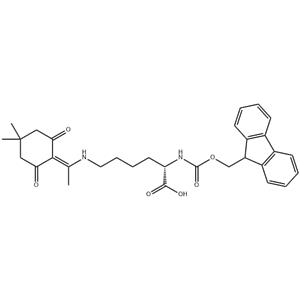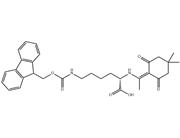Peptide Synthesis: Fmoc-Lys(DDE) is a building block for the synthesis of peptides and proteins. The Fmoc group acts as a protective group that allows for selective deprotection and coupling of amino acids during solid-phase peptide synthesis. The DDE (1,2-diaminoethane) side chain provides a reactive group that can be further modified or conjugated with other molecules.
Bioconjugation: Fmoc-Lys(DDE) can be used as a conjugation site for attaching peptides or proteins to various surfaces, carriers, or biomaterials. The DDE group can react with various functional groups, such as thiols or amines, to form stable bonds, enabling the immobilization of peptides for biosensor development, drug delivery, or tissue engineering applications. Biological Studies: Fmoc-Lys(DDE) can be incorporated into peptides to study their interaction with biological targets, such as receptors, enzymes, or cell surfaces. The presence of the DDE group allows for post-synthetic modification, enabling the introduction of probes, fluorescent tags, or other moieties for detection and quantification purposes. Drug Discovery: In the field of drug discovery, Fmoc-Lys(DDE) can be used as a part of peptide-based drug candidates. The DDE group can be exploited for site-specific drug conjugation or for the introduction of linker moieties that enhance the pharmacokinetic properties or target specificity of the peptide drug. | 
 China
China



